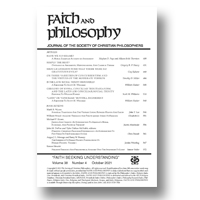|
|
|
1.
|
Faith and Philosophy:
Volume >
27 >
Issue: 1
Sharon Krishek
The Enactment of Love by Faith:
On Kierkegaard’s Distinction Between Love and Its Works
abstract |
view |
rights & permissions
| cited by
The aim of this paper is to throw light on Kierkegaard’s neglected distinction between love and its works, and by doing so to resolve the ambivalence in his position with regard to preferential love in Works of Love. In this text Kierkegaard seems to fail to reconcile his insistence on neighbourly love’s demand for equality and self-denial, with his wish to affirm the centrality of preferential love to human existence. My claim is that neighbourly love and preferential love are two distinct works of love that share the double structure of faith. This paradoxical structure, presented and discussed by Kierkegaard in Fear and Trembling, allows the two loves to be realized together, without requiring any compromise regarding their respective demands.
|
|
|
|
|
|
|
2.
|
Faith and Philosophy:
Volume >
27 >
Issue: 1
W. Matthews Grant
Can a Libertarian Hold that Our Free Acts are Caused by God?
abstract |
view |
rights & permissions
| cited by
According to prevailing opinion, if a creaturely act is caused by God, then it cannot be free in the libertarian sense. I argue to the contrary. I distinguish intrinsic and extrinsic models of divine causal agency. I then show that, given the extrinsic model, there is no reason one holding that our free acts are caused by God could not also hold a libertarian account of human freedom. It follows that a libertarian account of human freedom is consistent with God’s being the source and cause of all being apart from himself, including the being of free human actions.
|
|
|
|
|
|
|
3.
|
Faith and Philosophy:
Volume >
27 >
Issue: 1
J. L. Schellenberg
The Hiddenness Problem and the Problem of Evil
abstract |
view |
rights & permissions
| cited by
The problem of Divine hiddenness, or the hiddenness problem, is more and more commonly being treated as independent of the problem of evil, and as rivalling the latter in significance. Are we in error if we acquiesce in these tendencies? Only a careful investigation into relations between the hiddenness problem and the problem of evil can help us see. Such an investigation is undertaken here. What we will find is that when certain knots threatening to hamper intellectual movement are unravelled, the hiddenness problem emerges as a contender in its own right—one that may generate serious difficulties for theism regardless of conclusions drawn concerning the force of the problem of evil.
|
|
|
|
|
|
|
4.
|
Faith and Philosophy:
Volume >
27 >
Issue: 1
Graham Oppy
Uncaused Beginnings
abstract |
view |
rights & permissions
| cited by
I defend the view that it is possible for reality to have a contingent initial state under the causal relation even though it is impossible for any other (non-overlapping) parts of reality to have no cause. I claim that, while there are good theoretical and commonsense grounds for maintaining that it is simply not possible for non-initial parts of reality to have no cause, these good grounds do not require one to claim that it is impossible that reality has an uncaused initial state.
|
|
|
|
|
|
|
5.
|
Faith and Philosophy:
Volume >
27 >
Issue: 1
William Lane Craig
Reflections On “Uncaused Beginnings”
abstract |
view |
rights & permissions
| cited by
Graham Oppy’s interesting analysis of the “causal shape” of reality conflates causal ordering with temporal ordering of causes and assigns the wrong causal shape to reality as conceived by many classical theists. His argument for the possibility of uncaused beginnings is also hobbled by his tendency to ignore the crucial issue of the objective reality of tense and temporal becoming. Oppy’s claims that only certain types of things can come into being uncaused at a first moment of time and that things cannot now come into being uncaused are examined and found implausible and explanatorily vacuous.
|
|
|
|
|
|
|
6.
|
Faith and Philosophy:
Volume >
27 >
Issue: 1
Stewart Goetz
Naturally Understanding Naturalism
abstract |
view |
rights & permissions
| cited by
In his excellent book World without Design, Michael Rea argues that naturalism is not a philosophical thesis but a research program. I believe that there is good reason to question Rea’s claim about naturalism. In this brief paper, I critique Rea’s argument and defend a particular understanding of naturalism as a philosophical thesis.
|
|
|
|
|
book reviews |
|
7.
|
Faith and Philosophy:
Volume >
27 >
Issue: 1
Rico Vitz
Breaking the Spell:
Religion as a Natural Phenomenon
view |
rights & permissions
| cited by
|
|
|
|
|
8.
|
Faith and Philosophy:
Volume >
27 >
Issue: 1
David Werther
The Principle of Sufficient Reason:
A Reassessment
view |
rights & permissions
| cited by
|
|
|
|
|
9.
|
Faith and Philosophy:
Volume >
27 >
Issue: 1
Myron Bradley Penner
Kierkegaard on Faith and the Self:
Collected Essays
view |
rights & permissions
| cited by
|
|
|
|
|
10.
|
Faith and Philosophy:
Volume >
27 >
Issue: 1
C. G. Weaver
Persons:
Human and Divine
view |
rights & permissions
| cited by
|
|
|
|
|
11.
|
Faith and Philosophy:
Volume >
27 >
Issue: 1
Paul Reasoner
Getting Even:
Forgiveness and Its Limits
view |
rights & permissions
| cited by
|
|
|
|
|
12.
|
Faith and Philosophy:
Volume >
27 >
Issue: 1
Christopher Brunelle
Love Song for the Life of the Mind:
An Essay on the Purpose of Comedy
view |
rights & permissions
| cited by
|
|
|
|
